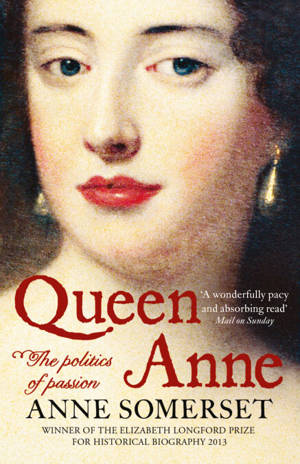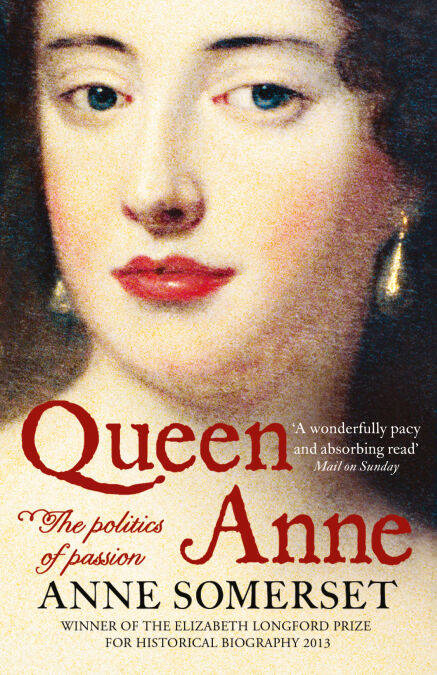
- Afhalen na 1 uur in een winkel met voorraad
- Gratis thuislevering in België vanaf € 30
- Ruim aanbod met 7 miljoen producten
- Afhalen na 1 uur in een winkel met voorraad
- Gratis thuislevering in België vanaf € 30
- Ruim aanbod met 7 miljoen producten
Zoeken
Omschrijving
Her personal life riven by passion, illness and intrigue, Queen Anne presided over some of the most momentous events in British history. Like Antonia Fraser’s life of Marie Antoinette or Amanda Foreman’s ‘The Duchess’, ‘Queen Anne’ is historical biography at its best.
In 1702, fourteen years after she helped oust her father from his throne and deprived her newborn half-brother of his birthright, Queen Anne inherited the crowns of England and Scotland. Childless, despite seventeen pregnancies that had either ended in failure or produced heartrendingly short-lived offspring, in some respects she was a pitiable figure. But against all expectation she proved Britain’s most successful Stuart ruler.
Her reign was marked by many triumphs, including union with Scotland and glorious victories in war against France. Yet while her great general, the Duke of Marlborough, was performing feats of military genius, Anne’s relationship with his outspoken wife Sarah was becoming ever more rancorous. Political differences partly explained why the Queen’s earlier adoration for Sarah transformed to loathing, but the final rupture was precipitated by Sarah’s startling claim that it was the Queen’s lesbian infatuation with another lady-in-waiting, Abigail Masham, that had destroyed their friendship.
Having lost the will to continue an expensive war that the Marlboroughs and their political allies favoured, the Queen embarked upon a peace process that some condemned as a betrayal of the national interest. And, as it became clear that Anne did not have long to live, the nation became polarised by fears that she intended to bequeath her crown to her Catholic half brother, rather than the German Protestant cousin whom Parliament had designated her heir.
Drawing widely on unpublished sources, Anne Somerset vividly depicts the clashes of personality and party rivalries that aroused such strong feelings at the time. Traditionally depicted as a weak ruler dominated by female favourites and haunted by remorse at having deposed her father, Queen Anne emerges as a woman whose unshakeable commitment to duty enabled her to overcome private tragedy and painful disabilities, setting her kingdom on the path to greatness.
In 1702, fourteen years after she helped oust her father from his throne and deprived her newborn half-brother of his birthright, Queen Anne inherited the crowns of England and Scotland. Childless, despite seventeen pregnancies that had either ended in failure or produced heartrendingly short-lived offspring, in some respects she was a pitiable figure. But against all expectation she proved Britain’s most successful Stuart ruler.
Her reign was marked by many triumphs, including union with Scotland and glorious victories in war against France. Yet while her great general, the Duke of Marlborough, was performing feats of military genius, Anne’s relationship with his outspoken wife Sarah was becoming ever more rancorous. Political differences partly explained why the Queen’s earlier adoration for Sarah transformed to loathing, but the final rupture was precipitated by Sarah’s startling claim that it was the Queen’s lesbian infatuation with another lady-in-waiting, Abigail Masham, that had destroyed their friendship.
Having lost the will to continue an expensive war that the Marlboroughs and their political allies favoured, the Queen embarked upon a peace process that some condemned as a betrayal of the national interest. And, as it became clear that Anne did not have long to live, the nation became polarised by fears that she intended to bequeath her crown to her Catholic half brother, rather than the German Protestant cousin whom Parliament had designated her heir.
Drawing widely on unpublished sources, Anne Somerset vividly depicts the clashes of personality and party rivalries that aroused such strong feelings at the time. Traditionally depicted as a weak ruler dominated by female favourites and haunted by remorse at having deposed her father, Queen Anne emerges as a woman whose unshakeable commitment to duty enabled her to overcome private tragedy and painful disabilities, setting her kingdom on the path to greatness.
Specificaties
Betrokkenen
- Auteur(s):
- Uitgeverij:
Inhoud
- Aantal bladzijden:
- 416
- Taal:
- Engels
Eigenschappen
- Productcode (EAN):
- 9780007457045
- Verschijningsdatum:
- 18/01/2012
- Uitvoering:
- E-book
- Beveiligd met:
- Adobe DRM
- Formaat:
- ePub

Alleen bij Standaard Boekhandel
+ 8 punten op je klantenkaart van Standaard Boekhandel
Beoordelingen
We publiceren alleen reviews die voldoen aan de voorwaarden voor reviews. Bekijk onze voorwaarden voor reviews.











